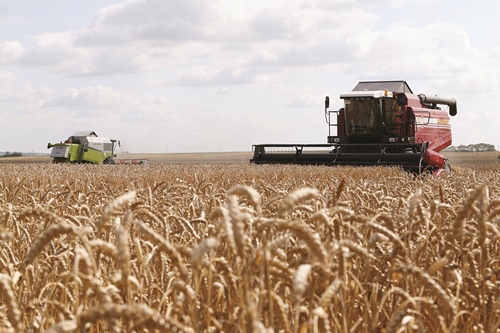Severe drought looks set to reduce harvest volumes, but Belarusians will still enjoy enough bread, vegetables, meat and milk. Agricultural specialists have ways of counteracting weather surprises, as the President saw on visiting the Minsk District. Upon arrival, he toured a field of autumn wheat overseen by Minsk’s Vegetable Factory.

New sample of Gomselmash JSC combine during grain harvesting campaign. Photo BelTA
This is the 34th harvest for Director Vladimir Parchevsky and he notes that this year is richer than usual, set to surpass the traditional 55 centners per hectare. He explains modestly, “There is no special secret. Productivity depends on how you treat the land. Over the past three years, we’ve been using organic fertilisers and have been able to reduce the amount since 2014, 10 tonnes this year against 24 tonnes last.”
Prime Minister Mikhail Rusy spoke of the future harvest with optimism, saying, “According to our calculations, all regions — except for Gomel [where the drought was extreme] — should gather over a million tonnes. The Minsk Region may harvest up to two million. We guess that around 7.8 million tonnes of grain will be harvested: 700-800,000 tonnes less than in 2014. However, corn is demonstrating good yields this year.”
The Chairman of the Minsk District Executive Committee, Piotr Yarmosh, gave the President an update on harvesting and showed him the ‘cap’ method of defining when the grain is mature. When thrown upon the plants, if it remains suspended on top, it shows that the grain is ready for harvesting. Mr. Lukashenko’s first throw failed to work, but the second remained on the heads. “Let’s consider that it’s not fallen,” Mr. Lukashenko smiled.
He then put the cap on his own head and approached a Palesse combine harvester: a new Gomselmash model, with a 500HP engine. He heard about the technical characteristics and then, jointly with his son Nikolay, climbed into the cabin, to assess its operation. On asking the drivers if it rivalled a German harvester?’ he was assured that it did.
Once combine harvesters complete their work, the clear fields must be promptly seeded with feeding crops. Everything is proceeding as planned, so cattle will enjoy enough forage.
Mr. Lukashenko then went to the Minsk Vegetable Factory’s greenhouses, which grow a wide range, from tomatoes, aubergines, cucumbers, carrots, onions and beetroot, to garlic and greens. Gathered at 6am, just three hours later they are on the shelf of Minsk shops. The enterprise also grows medicinal herbs, which are perfect for its bees: it makes both honey and phyto-teas. On tasting it, the President praised the honey’s sweetness.
With an annual profit of Br20bn, the business is certainly doing well and demand is steadily growing. Mr. Lukashenko has ordered that as many greenhouses as needed are built in the coming five years.
The Minsk factory also produces meat and milk, showing that Belarusians can do anything. Some time ago, people tried to persuade the President that greenhouses were tiresome and unprofitable, and that we couldn’t compete with Russia, having no natural gas of our own. It was proposed that existing greenhouses be destroyed and that we rely on imported vegetables. Mr. Lukashenko responded by requesting that obsolete greenhouses be disassembled and replaced by new, modern built frames.
The Dutch, for example, buy gas at $500, but they can compete globally in this sphere, showing that high heating costs can be overcome. We are in no worse a position. The production of harvesters was also proposed to end, with Belarus buying German instead. A similar theory was put forward for the growing of sugarbeet (going over to imports instead). If we had followed such suggestions, our food security would be less secure and our export revenue would not be as it is.
Mr. Lukashenko was displeased with the Government’s previous subsidised protection of the domestic market, saying that enterprises needed to operate independently, at a profit. “We’ve ceded our markets to Spain and Holland but need to find new in Africa and China,” he stressed. According to the President, the key principle remains unchanged: no one should take advantage of people and the state budget. Everything should be fair and honest.
By Alexander Pimenov











